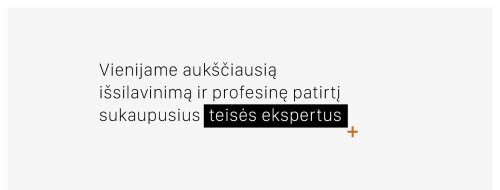Best Wage & Hour Lawyers in Kaunas
Share your needs with us, get contacted by law firms.
Free. Takes 2 min.
List of the best lawyers in Kaunas, Republic of Lithuania
About Wage & Hour Law in Kaunas, Republic of Lithuania
Wage and hour law in Kaunas, as throughout the Republic of Lithuania, is designed to regulate the relationship between employers and employees regarding salaries, working hours, overtime, and rest periods. These laws aim to ensure fair treatment in the workplace and protect workers from exploitation. The main legal framework for wage and hour matters is the Lithuanian Labour Code, which sets out minimum employment standards, compulsory working time, payment procedures, and protections against unfair wage practices.
Why You May Need a Lawyer
There are many situations where an individual or business may require legal help with wage and hour issues in Kaunas. Common scenarios include wage disputes, unpaid overtime claims, disagreements about working hours or leave entitlements, termination without proper compensation, and unlawful deductions from wages. Employees may also face challenges regarding contracts that do not comply with the Labour Code or discrimination in pay. Employers might seek legal advice to ensure compliance with local laws, draft employment contracts, or manage disputes. In complex cases, professional legal assistance is crucial to protect your rights and achieve a fair resolution.
Local Laws Overview
The Lithuanian Labour Code is the primary legislation governing employment relationships in Kaunas. Key aspects of wage and hour law include:
- Minimum Wage: Set by the Lithuanian government and periodically indexed. No employee can be paid less than the statutory minimum wage.
- Working Hours: The standard workweek is 40 hours (8 hours per day). Shorter hours apply to certain professions or vulnerable groups (such as minors).
- Overtime: Overtime work is generally limited and requires additional payment – typically at least 1.5 times the regular hourly rate – unless otherwise provided by individual employment agreements or sectoral collective agreements. Overtime must be agreed upon, except in specific emergency situations.
- Rest Periods and Leave: Employees are entitled to daily and weekly rest periods, as well as annual paid leave. There are regulations regarding breaks during the workday and mandatory time off.
- Payment Procedures: Wages must be paid at least once per month, and deductions are allowed only in very specific cases as provided by law.
- Child and Youth Labor: Special rules apply to the employment of minors, including restrictions on working hours and types of work allowed.
- Recordkeeping: Employers are required to keep accurate records of working time and wage payments to comply with inspection requirements.
- Dispute Resolution: Wage and hour disputes can be settled through labor dispute commissions, mediation, or the courts.
Employers who violate wage and hour regulations may face administrative fines or even criminal liability for serious breaches.
Frequently Asked Questions
What is the current minimum wage in Kaunas, Lithuania?
The minimum gross monthly wage is set by the Lithuanian government and is the same throughout the country, including Kaunas. As of 2024, it is 924 EUR per month before taxes. This figure can be periodically updated.
How many hours can I be required to work per week?
The standard maximum working time is 40 hours per week (8 hours per day), excluding overtime. Working hours may be adjusted in certain jobs by collective agreements or special regulations.
Is overtime work mandatory and how is it paid?
Overtime work is not mandatory and generally requires the employee’s consent, except in cases prescribed by law (such as emergencies). Overtime must be paid at least 1.5 times the regular hourly rate, and higher rates can be agreed upon.
Am I entitled to breaks during my working day?
Yes, employees are entitled to a rest break of at least 30 minutes if the working day exceeds 6 hours. Pregnant women and certain other groups have the right to additional breaks.
How often should I receive my salary?
Wages must be paid at least once per month, either at the end of the working month or based on an agreement between the parties, but not less than once a month.
What can I do if my employer does not pay my wages on time?
If you do not receive your wages, you should first address your employer in writing. If the issue is not resolved, you can apply to the State Labour Inspectorate or file a complaint with a labor disputes commission or the court.
Can my employer deduct money from my wages?
Deductions from wages are permitted only in specifically outlined situations, such as for social insurance, taxes, or with the employee's permission. Unauthorized deductions are illegal.
What rights do part-time employees have regarding wages and hours?
Part-time employees in Kaunas have the same wage and hour rights as full-time employees, but remuneration and entitlements are calculated proportionally to the hours worked.
What is the procedure for claiming unpaid wages?
You should first request payment from your employer. If unresolved, submit an application to the State Labour Inspectorate or file a claim with the labor disputes commission. Supporting documentation such as employment contracts and pay slips will aid your case.
Are interns and trainees protected by wage and hour laws?
Yes, interns and trainees are protected if they are in employment relationships, including requirements for fair pay and legal working hours. Some exceptions apply to educational internships agreed upon by educational institutions and employers.
Additional Resources
Several institutions and resources can provide information or assistance with wage and hour issues in Kaunas:
- State Labour Inspectorate (Valstybinė darbo inspekcija): Supervises labor rights compliance, investigates complaints, and provides advice.
- Labour Disputes Commission (Darbo ginčų komisija): Handles employment-related disputes, including unpaid wage claims.
- Social Security Institutions (Sodra): Provides information on social insurance and employment benefits.
- Legal Aid Services: Free or subsidized legal assistance may be available in some cases, especially for low-income individuals.
- Law Firms and Independent Lawyers: Local law professionals specializing in employment law can provide tailored legal advice.
Next Steps
If you believe your wage and hour rights have been violated in Kaunas, or if you are unsure about your obligations as an employer, consider taking the following steps:
- Gather all relevant documents, such as employment agreements, pay slips, communications with your employer, and work schedules.
- Try to resolve the issue amicably with your employer, where possible.
- If the issue persists, contact the State Labour Inspectorate or file a claim with the Labour Disputes Commission. Deadlines for submitting claims may apply.
- Consider consulting a lawyer with experience in employment law in Kaunas, especially in complex or high-value disputes.
- Do not delay seeking help if you feel your rights have been infringed, as there are statutory limitation periods for bringing claims.
Seeking timely advice and taking action can help protect your rights and ensure you receive fair treatment in the workplace.
Lawzana helps you find the best lawyers and law firms in Kaunas through a curated and pre-screened list of qualified legal professionals. Our platform offers rankings and detailed profiles of attorneys and law firms, allowing you to compare based on practice areas, including Wage & Hour, experience, and client feedback.
Each profile includes a description of the firm's areas of practice, client reviews, team members and partners, year of establishment, spoken languages, office locations, contact information, social media presence, and any published articles or resources. Most firms on our platform speak English and are experienced in both local and international legal matters.
Get a quote from top-rated law firms in Kaunas, Republic of Lithuania — quickly, securely, and without unnecessary hassle.
Disclaimer:
The information provided on this page is for general informational purposes only and does not constitute legal advice. While we strive to ensure the accuracy and relevance of the content, legal information may change over time, and interpretations of the law can vary. You should always consult with a qualified legal professional for advice specific to your situation.
We disclaim all liability for actions taken or not taken based on the content of this page. If you believe any information is incorrect or outdated, please contact us, and we will review and update it where appropriate.
















